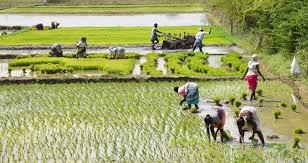Farmers in Odisha return to paddy cultivation for lure of Minimum Support Price
Despite government efforts to encourage crop diversification in the rain-fed Sundargarh district, many farmers are greeting back to paddy cultivation on upland lured by the attractive minimum support price (MSP) of Rs 3,100 per quintal.
Paddy farming on upland is labour-intensive, less remunerative, and carries risks, especially with the increasing unpredictability of the monsoon. This kharif season, the paddy cultivation target has been reduced to 1,94,700 hectare (ha) out of a total 3.13 lakh ha of farmland, while the target for non-paddy crops has increased to 1,18,300 ha.
In 2013, 2.14 lakh ha were dedicated to paddy, with 99,000 ha for non-paddy crops. Over 11 years, sustained efforts have led to the diversification of 19,300 ha to non-paddy crops.
With the gradual change in mindset of paddy farmers it could be a blow to the efforts of the Agriculture department to replace paddy farming on upland with more remunerative and resilient non-paddy crops.
The district has 1.63 lakh ha of upland, 95,000 ha of medium land, and 55,000 ha of lowland. This year, the entire medium and lowland areas, along with 44,700 ha of bonded upland, are targeted for paddy cultivation.
Sundargarh chief district agriculture officer (CDAO) Harihar Nayak said that paddy farming on upland has never been profitable, with yields of just 8-10 quintal per ha compared to 25-30 quintal or more on medium and lowland. “Non-paddy crops are safer and more profitable, given the erratic monsoon patterns. However, the high MSP is attracting some farmers back to paddy,” he added. The administration would continue to pursue them for crop diversification, he further stated.
During a recent grievance hearing in the Talsara Assembly constituency, some farmers expressed their willingness to take up paddy farming in the upcoming rabi season if MSP is assured.
Paddy procurement in Sundargarh has decreased, as the 2023-24 target was set at 20.87 lakh quintal.

This article has been republished from The New Indian Express.

